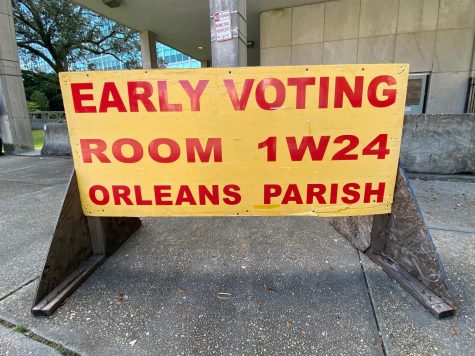OPINION | In 2020, voting is not optional
November 2, 2020

The future of the U.S. rests on the shoulders of the 2020 presidential election. This election falls in the midst of a global pandemic which resulted in a nationwide recession. The U.S. Senate confirmed a new Supreme Court Justice this week, solidifying a 6-3 conservative majority on the Supreme Court. The next four years will also play a critical role in the fight against climate change, which poses an existential threat to humanity as we know it. Essentially, it is now more important than ever to fulfil one’s civic duty of voting.
For college students in particular, the outcome of this year’s election is immensely important. Many students will join the postgraduate world while attempting to enter a workforce still grappling with the economic effects of COVID-19.
Aside from the varying economic factors between the Democratic and Republican Parties, presidential candidates from both party lines differ greatly in their proposed COVID-19 response. Former Vice President Joe Biden plans to use federal funds to expand testing and access to personal protective equipment and to create a task force addressing the racial disparities seen amongst COVID-19 deaths. In comparison, President Donald Trump has yet to release an official plan for tackling the pandemic during his potential second term in office, but he remains adamant that a vaccine is on the horizon.
The stark contrast in the two candidates’ approaches to a virus that has claimed over 200,000 American lives only begins to illustrate the gravity of this election. Moreover, upon juxtaposing the two candidates, there appears to be a repeated theme of Biden’s ideas being grounded in logic and Trump’s in theatrics.
Aside from the politics, failing to vote is reflective of a person’s own privilege and ignorance. Registering to vote, in most states, is not an impossible task. That being said, certain states do complicate the process for select demographics. While absentee voting may be tiresome for college students, minor grievances do not serve as an adequate excuse for not attempting the process entirely.
Tulane University students have the option of registering and voting in Louisiana or via absentee ballots in their home states, which for only 10% of the student body is Louisiana. In the class of 2024, 28% of students are from the Northeast and an additional 13% are from the Pacific West. A majority of the states in these select regions more often than not are won by Democrats. Louisiana, however, is a historically red state. Given 70% of college students plan on voting for Joe Biden, Tulane students’ votes could hold immense influence in Louisiana, potentially more so than their home states.
When Tulane students decide where to cast their ballot for the 2020 election, which most already have, there are many considerations to take into account. First, Tulane’s socio-economic and racial demographics do not align with those of Louisiana as a whole. The median family income of a Tulane student is $180,700, which is more than three times that of Louisiana families. Only 8.6% of Tulane is African American, compared to 32.8% of Louisiana. Additionally, the White House is not the only hot ticket on this year’s ballot. In Louisiana, there are seats up for election in the Senate, House of Representatives, state legislature, state Supreme Court, local courts and the municipal government. Tulane students, most of whom only temporarily live in Louisiana, are not as invested in the outcomes of these elections, compared to full-time Louisiana residents..
The mere idea that a vote in one state holds greater influence than a vote in another shows an inherent flaw in the U.S. electoral system. In reality, even if all 14,000 of Tulane’s students voted in Louisiana, it would have little sway in whether the state turns blue or red, as over 2 million people voted in Louisiana in 2016. Regardless, no matter where each student chose to vote, it is imperative they respect this commitment and their democratic privilege.






















Student • Nov 3, 2020 at 6:47 am
I’m from Louisiana and I’m so sick and tired of ignorant, dumb tulane kids getting involved in my state politics. You literally spent your whole life growing up in an LA suburb and you’re going to spent 0.75 of the next 4 years in the Tulane bubble. You know nothing about Louisiana outside of your safe space bubble, you are just using Louisiana for your quick college fun then leaving. You have no right to get in our state politics. It is disrespectful to the people who grew up here.